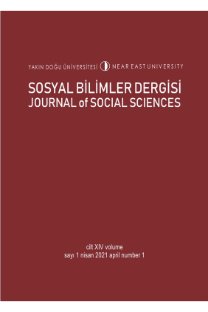The İslamist challenge in Egypt
___
Al-Awadi, Hisham (2004), In Pursuit of Legitimacy: The Muslim Brothers and Mubarak, London and New York: Tauris.Al-Banna, Hasan (1979), Selected Prayers, Indianapolis: Islamic Teaching Center.
Altman, Israel (1979), "Islamic Movements in Egypt", The Jerusalem Quarterly, No. 10.
Christian Science Monitor, July 9, 1993.
Cordahi, Cherif (1995), "Egypt: Facilitating Extradition", Middle East International, May 12, 1995.
Duran, Burhanettin (2010). "Cezayir: Sömürgeci Geçmişin Gölgesinde İç Savaştan Uzlaşıya", Dünya Çatışmaları, Cilt I, İnat, Kemal; Duran, Burhanettin ve Ataman, Muhittin (Eds.), Ankara: Nobel.
Esposito, John L. (1995), The Islamic Threat: Myth or Reality? New York and Oxford: Oxford University Press.
Faksh, Mahmud A. (1997), The Future of Islam in the Middle East: Fundamentalism in Egypt, Algeria, and Saudi Arabia, West, Conn.: Praeger.
Finklestone, Joseph (1996), Anwar Sadat, Portland, OR: Frank Cass.
Gopin, Marc (2000), Between Eden and Armageddon: The Future of World Religions, Violence, and Peacemaking, Oxford and New York: Oxford University Press.
Hatina, Meir (2007), Identity Politics in the Middle East: Liberal Thought and Islamic Challenge in Egypt, New York: Taurus Academic Studies.
Huntington, Samuel P. (1993), "The Clash of Civilization?", Foreign Affairs, Vol. 72, No. 3.
Hussain, Asaf (1983), Islamic Movements in Egypt, Pakistan, and Iran, London: Mansell Publishing.
Ibrahim, Saad E. (1996), Egypt, Islam, and Democracy: Twelve Critical Essays. Cairo, Egypt: American University in Cairo Press.
International Monetary Fund (2010), Retrieved April 21,2010.
Karawan, Ibrahim et al, (2008), Values and Violence, Dordrecht, The Netherlands: Norwell, Mass.
Kepel, Gilles (1985), The Prophet and The Pharaoh, London: Al Saqi Books.
Kerr, Malcolm H. (1968), "Egypt", in Education and Political Development, Coleman, James S. (Ed.), Princeton, NJ: Princeton University Press.
Mitchell, Richard P. (1969), The Society of Muslim Brothers, London: Oxford University Press.
Montville, Joseph V. (1990), "The Arrow and the Olive Branch: A Case for Track Two Diplomacy," in The Psychodynamics of International Relationships, Vol. II, Volkan, Vamik D. et al. (Eds.), Lexington, Mass: Lexington Books.
Pruitt, Dean G., Kim, Sung H. and Rubin, Jeffrey Z. (2004), Social Conflict: Escalation, Stalemate, and Settlement, 3rd Ed., New York: McGraw-Hill.
Roy, Oliver (1994), The Failure of Political Islam, Cambridge, Mass.: Harvard University Press.
Roy, Oliver (2007), Secularism Confronts Islam, New York: Columbia University Press.
Rubin, Barry M . (2010), The Muslim Brotherhood: The Organization and Policies of a Global Islamist Movement, New York, NY: Palgrave Macmillan.
Rutherford, Bruce K. (2008), Egypt After Mubarak, Princeton: Princeton University Press.
Sciolino, Elaine (1993), "Egypt Warned US of Terror, Mubarak Says", New York Times, April 5, 1993.
Scott, Rachel M. (2010), The Challenge of Political Islam: Non-Muslims and the Egyptian State, Standford, CA: Standford University Press.
Shehata, Dina (2010), Islamists and Secularists in Egypt: Opposition, Conflict, and Cooperation. London and New York: Routledge.
Sherif, Muzaffer (1988), Robbers Cave Experiment: Intergroup Conflict and Cooperation, Middletown, Conn: Wesleyan University Press.
Spencer, Robert (2010), "Muslim Brotherhood Jockeys for Power in Egypt", Human Events, Vol. 66, No. 27.
Qutb, Sayyid (2000), Milestones, Damascus, Syria: Dar al-Ilm.
Ursula, Lindsey (2010), "Egypt's Muslim Brotherhood: The Widening Split Between Young and Old", Christian Science Monitor, December 21, 2009.
Winter, Michael (1995), "Islam in the State: Pragmatism and Growing Commitment," in Egypt from Monarchy to Republic: A Reassessment of Revolution and Change, Shamir, Shimon (Ed.), Boulder, CO: Westview Press.
Yılmaz, Muzaffer E. (2002), Religious Revivalism in the Social Identity Context, Unpublished Doctoral Dissertation, George Mason University, Fairfax, VA, USA.
Yılmaz, Muzaffer E. (2005), "Interactive Problem Solving in Intercommunal Conflicts", Peace Review, Vol. 17, No. 4.
Zuhur, Sherifa (2007), Egypt: Security, Political, and Islamic Challenges, Charlisle, PA: US Army War College.
- ISSN: 1986-1303
- Yayın Aralığı: 2
- Başlangıç: 2008
- Yayıncı: Yakın Doğu Üniversitesi
OECD ülkeleri vergi sistemi esnekliğinin panel eşbütünleşme testleri ile analizi
C. Erdem HEPAKTAN, SERKAN ÇINAR
Manuel Catells'i yeniden okumak: Küresel ağ hareketleri yaklaşımının eleştirel bir değerlendirmesi
Asiatic mode of production and the Ottoman Empire
Oedipus at Colonus as a divine comedy
The İslamist challenge in Egypt
Kıbrıslı Türk siyasal seçkinlerin demografik profilleri
A pioneer in Ottoman sociology: Prince Sabahattin
Birinci sınıf mülki adare amirliği düzenlemesi üzerine eleştirel bir değerlendirme
